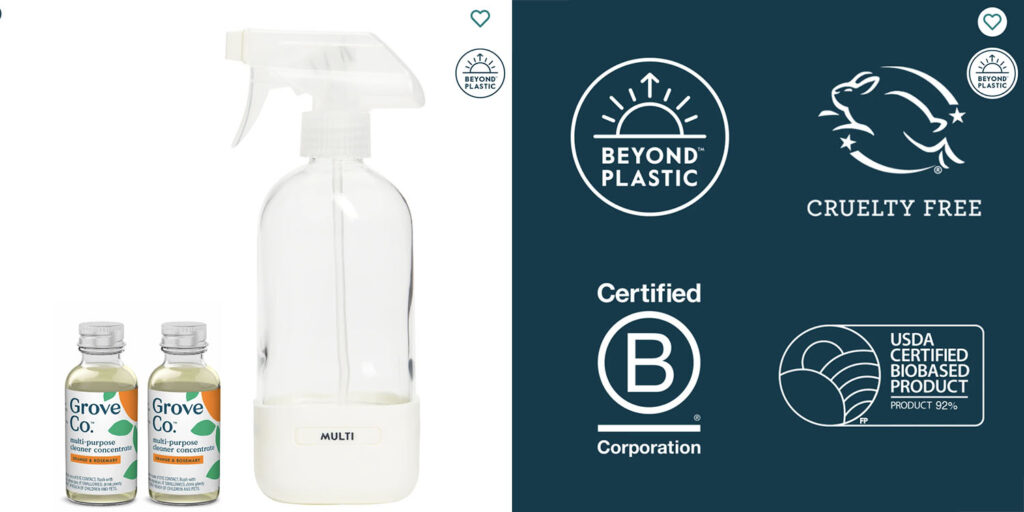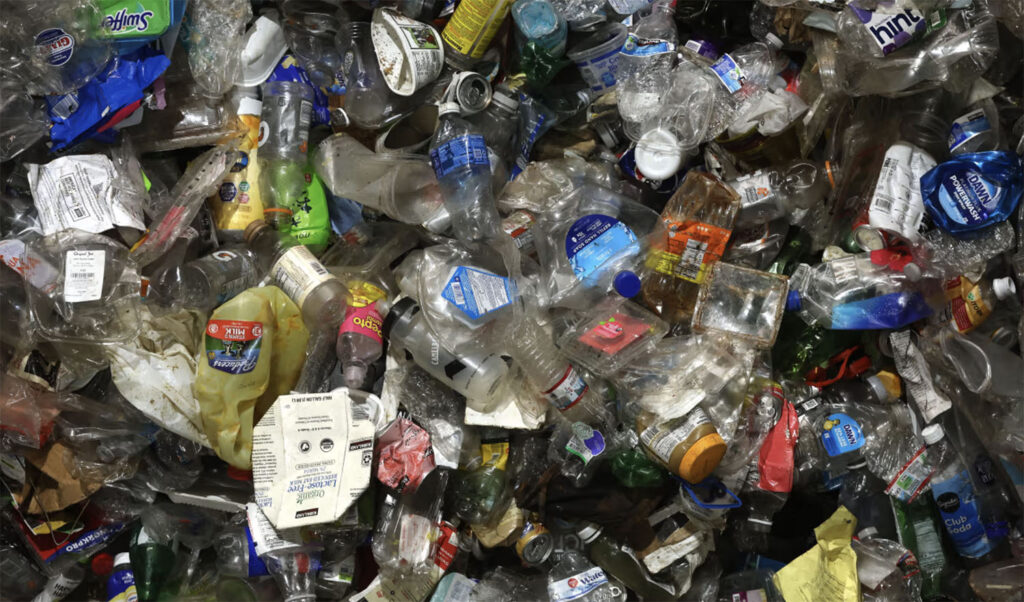By Alliance Communications Coordinator Amy Durr
There aren’t too many things that get me excited about cleaning but the arrival of spring is one of them. Throw open the windows, listen to the birds, grab the cleaning supplies! Or something like that.
I’m going to tell you something you may not know about Alliance President Terry Gips, a thing that I very much admire: his entire house is a chemical-free zone. I was astonished the first time he told me, because the thought had never crossed my happy little sustainability-focused brain.
In fact, that conversation set me on the path to rid my home of toxic chemicals. It isn’t quite toxin-free because sometimes I panic and run to the closest superstore for drain cleaner. But mostly I’ve been attentive, reading labels and doing my research.
So, where can you start as there are so many products for all aspects of green cleaning? Let’s focus on general purpose spray cleaners. I’ll begin with homemade cleaners and move on to those recommended by the Environmental Working Group. Finally, I’ll share my personal recommendation and why I like it.
The Cheapest and Most Sustainable Solution
As I became more concerned about plastics and toxic chemicals, I read about people making their own cleaners. I liked the idea that I knew all of the ingredients and that they were safe. Plus, DIY homemade cleaners are the cheapest and most sustainable solution.
You can easily make your own and save huge amounts of money. For example, Real Simple has an easy recipe for an all-purpose cleaner: 3/4 cup water, 1/4 cup rubbing alcohol, 5 to 10 drops peppermint, lemon, or orange essential oil and 1 squirt natural dish soap.
Some estimates show households can save over $800 annually by switching to natural cleaning alternatives. DIY natural cleaner recipes can be up to 95% cheaper than commercial products or only 5% of the cost of standard cleaners.
I’ve tried these in the past, but to be honest I don’t like the smell of vinegar and far prefer the scent of commercial green cleaners. However, they’re an excellent, eco-friendly option.
The Environmental Working Group’s Safest General Purpose Spray Cleaners

The Environmental Working Group (EWG) is a long-trusted source of reliable, evidence-based information. They’ve created a quick and easy list of some of the safest general purpose spray cleaners based on their EWG’s Guide to Healthy Cleaning. These are all available everywhere, from your co-op to places like CVS, Walgreens, Costco and Walmart.
Here are their picks:
For more than 20 years, EWG has been a trusted source for chemical safety advice. Because your home should be safe, we decided to develop standards for healthy cleaning that are based on independent scientific studies and EWG’s research.
The gold standard in health and wellness, EWG Verified® products meet that standard. Only one product was rated that highly. I had never heard of Attitude before so I was glad to learn about it.
EWG Green Rated
I was surprised that a number of well-known green cleaners did not make the list.
- ECOS All-Purpose Cleaner, Parsley Plus
- LYSOL Hydrogen Peroxide Action Multi-Purpose Cleaner
- Seventh Generation Disinfecting Multi-Surface Cleaner
- Fit Organic Multi-Surface Cleaner & Degreaser
- EverSpring All Purpose Cleaner, citrus and basil
These are all effective, highly-rated and affordable green cleaners that are widely available. However, given my commitment to sustainability, I’m looking for even more because I’m also concerned about everything from packaging and shipping to the company’s practices and treatment of workers.
I only wish that EWG would address these issues as well to provide conscious consumers with all the information they need to make a true choice for sustainability.
My Choice for a General Purpose Spray Cleaner: Grove Collaborative
Since I’m deeply concerned about the entire plastics industry and its impact on workers, consumers, wildlife and ecosystems, I seek truly green products with non-plastic containers and packaging.
Consequently, I’ve done additional research and discovered excellent, effective, affordable green cleaning products from Grove Collaborative. It’s a B-Corp fully committed to sustainability in all aspects of its operations.
Today, every Grove purchase is “plastic neutral.” That means for every ounce of plastic you purchase (from every brand across their site) they collect the same amount of ocean-bound plastic from nature in partnership with rePurpose Global. So far, Grove orders have recovered over 16,400,000 pounds of plastic from nature. See Grove’s Plastic Scorecard for more information.
Grove carries both their own green products, as well as others from aligned companies. I buy all of my green cleaning products from Grove Collaborative. I always start by looking at the full range of their product offerings. I don’t necessarily restrict myself to buying their own brand, sometimes opting for others due to price, packaging and ingredients.
In my initial purchase from them, they sent me highly-concentrated liquid cleaners in tiny glass bottles, along with reusable glass spray bottles for various applications. It’s so surprisingly simple – all I have to do is pour in the concentrate and add water up to the marked line already on the bottle. I then shake it and it’s ready to use.
I really like the fact that they use concentrates in order to reduce both space and weight from shipping, thereby reducing costs and greenhouse gas emissions. It doesn’t make sense to me to be shipping all the water used to make regular cleaning products.
I also appreciate that they use glass containers that are reusable and easily recyclable. Glass does not contain harmful chemicals that can leach into the products themselves.
In addition, they avoid plastics, except for the sprayer itself. Searching the site allows you to find products that are 100% plastic-free or 95% plastic-free like their spray bottles. And here’s my personal rant about plastic containers.
What I Don’t Like About Unnecessary Plastic Containers
I couldn’t disagree more with the advice of the prospective father-in-law of Dustin Hoffman in The Graduate: “I just want to say one word to you – just one word – ‘plastics’.”
While there are many uses of plastics that are needed at the present time because we don’t have safe, effective alternatives, we’ve gone way overboard and been sold a bad bill of goods about the benefits of plastic without assessing its harms.
Plastics are made from fossil fuel production that both pollutes our air and water while contributing to greenhouse gases and the climate crisis. Plastic production is often an environmental justice issue. It generally takes place in marginalized communities, such as predominantly poor and Black Cancer Alley on the Mississippi River, so that its emissions cause health problems for workers and residents.
We have known for a long time that plastic containers can leach endocrine-disrupting chemicals into the product. New studies now show that many of these plastics also contain harmful PFAS forever chemicals that also leach into the product itself. So when we use a spray cleaner, even if it’s “green,” could we actually be spreading these harmful chemicals?
And finally, only a relatively small percentage of plastic bottles are recycled, with far too many ending up in our lakes and oceans – where they ultimately will break down and become hazardous microplastics that birds, fish and humans ingest.
Fight for Your Right to Informative Product Ingredient Labeling

Whichever product you choose, the EWG is calling on all of us to become more conscious consumers and to demand Congress to require the full listing of chemicals in their formulations. It’s of great concern that bills have been introduced to deny consumers the right to find out what toxic chemicals are in cleaning products.
The most recent version of this legislation, H.R. 5978, seeks to override state laws creating more transparency about cleaning product ingredients. It also sets up an endless regulatory process that, at best, would yield a far weaker chemical disclosure system. Fortunately, this bill has not been passed, but we need to remain vigilant and call for more transparency, not less.
I hope what I discovered is helpful for you in making better choices and that you’ll be inspired to also get elected officials to do the right thing. I’d welcome hearing about your own experience.



